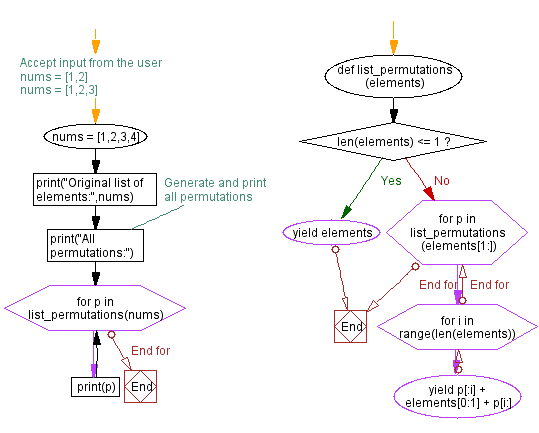Python permutations generator using generators
5. List Permutations Generator
Write a Python program to implement a generator function that generates all permutations of a given list of elements.
In mathematics, a permutation of a set is, loosely speaking, an arrangement of its members into a sequence or linear order, or if the set is already ordered, a rearrangement of its elements. The word "permutation" also refers to the act or process of changing the linear order of an ordered set. Permutations differ from combinations, which are selections of some members of a set regardless of order. For example, written as tuples, there are six permutations of the set {1, 2, 3}, namely (1, 2, 3), (1, 3, 2), (2, 1, 3), (2, 3, 1), (3, 1, 2), and (3, 2, 1).
Visual Presentation:

Sample Solution:
Python Code:
def list_permutations(elements):
if len(elements) <= 1:
yield elements
else:
for p in list_permutations(elements[1:]):
for i in range(len(elements)):
yield p[:i] + elements[0:1] + p[i:]
# Accept input from the user
# nums = [1,2]
# nums = [1,2,3]
nums = [1,2,3,4]
print("Original list of elements:",nums)
# Generate and print all permutations
print("All permutations:")
for p in list_permutations(nums):
print(p)
Sample Output:
Original list of elements: [1, 2] All permutations: [1, 2] [2, 1]
Original list of elements: [1, 2, 3] All permutations: [1, 2, 3] [2, 1, 3] [2, 3, 1] [1, 3, 2] [3, 1, 2] [3, 2, 1]
Original list of elements: [1, 2, 3, 4] All permutations: [1, 2, 3, 4] [2, 1, 3, 4] [2, 3, 1, 4] [2, 3, 4, 1] [1, 3, 2, 4] [3, 1, 2, 4] [3, 2, 1, 4] [3, 2, 4, 1] [1, 3, 4, 2] [3, 1, 4, 2] [3, 4, 1, 2] [3, 4, 2, 1] [1, 2, 4, 3] [2, 1, 4, 3] [2, 4, 1, 3] [2, 4, 3, 1] [1, 4, 2, 3] [4, 1, 2, 3] [4, 2, 1, 3] [4, 2, 3, 1] [1, 4, 3, 2] [4, 1, 3, 2] [4, 3, 1, 2] [4, 3, 2, 1]
Explanation:
In the above exercise,
- The "list_permutations()" function is defined as a generator function that takes a list of elements as input.
- The base case is checked using the condition if len(elements) <= 1. If the list length is less than or equal to 1, it means there is only one element or no elements, so the function yields the list itself.
- In the recursive case, the function iterates over all permutations of the sublist elements[1:] by calling list_permutations() recursively.
- For each permutation "p" in the recursive call, the function iterates over the indices of the original list using range(len(elements)).
- Within the inner loop, the function yields the permutation by combining the element at index i of the original list (elements[0:1]) with the remaining elements of the permutation (p[:i] + p[i+1:]).
- The outer loop continues generating permutations by yielding all possible combinations of the element at index i with the remaining elements.
Flowchart:

For more Practice: Solve these Related Problems:
- Write a Python program to create a generator that yields all possible permutations of a given list using recursion.
- Write a Python function that uses a generator to output each permutation of a list and then counts the total number of permutations.
- Write a Python script to generate permutations of a list, then filter and print only those permutations that start with a specific element.
- Write a Python program to generate all unique permutations from a list containing duplicate elements using a generator.
Go to:
Previous: Python Fibonacci generator using generators.
Next: Python combinations generator using generators.
Python Code Editor:
Contribute your code and comments through Disqus.
What is the difficulty level of this exercise?
Test your Programming skills with w3resource's quiz.
